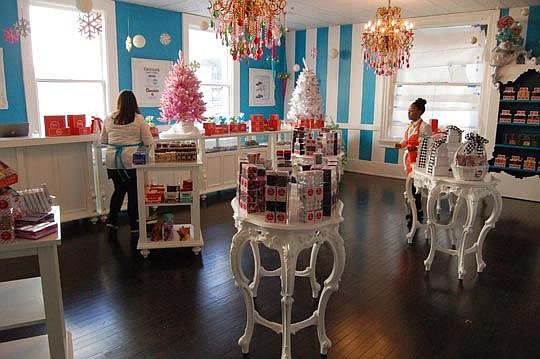
A billionaire, a local candy maker and a national reality TV show made a big splash in 2014 when the three joined forces to relocate Sweet Pete’s from Springfield to the Seminole Club at 400 N. Hogan St.
In December, Alan and Ellen Cottrill made a small splash of their own.
The owners of River City Contractors took home a Northeast Florida Builders Association Remodelers Council’s award for its historic renovation of Sweet Pete’s Downtown.
“This building has been such a gem,” said Ellen Cottrill. “It’s really an award for the whole city. We hope we’ve lived up to it and that it helps Jacksonville.”
Sweet Pete’s was featured last April in CNBC’s “The Profit,” a reality TV show in which billionaire Marcus Lemonis gives advice and money to struggling companies in exchange for an equity share.
In the case of Sweet Pete’s, Lemonis required the founders to rid themselves of what he called a “partnership gone bad.”
He also had them move their candy shop from their residential Springfield location to Downtown, where there would be more foot traffic.
It was an opportunity not only for Sweet Pete’s owners, but also for the Seminole Club, a 111-year-old building that had stood vacant for a decade.
Built in 1903, the Seminole Club was a private Downtown men’s-only club that hosted Jacksonville’s movers-and-shakers back in the day.
Teddy Roosevelt gave a campaign speech from its porch and years later, Massachusetts Sen. John F. Kennedy had coffee at the club after campaigning in Hemming Plaza.
Local architect Ted Pappas around 1975 completed a $1 million renovation of the club, which included adding elevators.
But the Seminole Club never recouped the debt, and it
closed in 1989.
It was bought in 1998 by an investment group for its proximity to the newly relocated City Hall. Jim Bailey, publisher of the Daily Record, was one of the group’s three original partners.
“(The Seminole Club) was a nice Downtown building and we wanted to salvage it and keep it alive,” Bailey said.
Several restaurants leased the building before it closed in 2004.
The city designated the Seminole Club a historic structure in 2006, the same year it was bought by investor Chris Hionides, who already owned other buildings on the block.
A bad time for real estate investments, Hionides turned the building over to the bank in 2011 and it remained unused until Lemonis bought it last year for $550,000.
“It really is old Jacksonville,” Cottrill said. “It was the ultimate candidate for a historic renovation — a beautiful residential building smack in the middle of Downtown.”
River City Contractors mainly performs commercial build-outs of offices, restaurants and car dealerships. The company had renovated historic homes in Avondale and Riverside, but never anything on the scale of the 22,000-square-foot Seminole Club.
Most of the work was cosmetic, Cottrill said. Still, there was a lot of it.
River City replaced rotted wood and painted old walls. It rebuilt a corner connecting the front and side porches, recreating what had originally been a wraparound porch.
Inside, walls were added or moved. The building’s old basketball court was converted into a candy-making production area.
Historic renovations present challenges not found in new construction, such as bringing everything up to code, Cottrill said.
They also bring surprises. In one room, contractors discovered an old safe that weighed several hundred pounds. It would prove difficult to move, and they had to figure out where to put it.
“At first we just painted it, but that didn’t work out very well,” Cotrill said.
Fortunately work finished in time to open Sweet Pete’s and an adjoining restaurant, The Candy Apple Café & Cocktails, before Christmas. It also finished in time for River City to enter the project into this year’s Remodelers Council awards.
“It was exciting to win,” Cottrill said. “At River City we love old buildings and also, we felt this project would be a way to contribute to Downtown.
(904) 356-2466